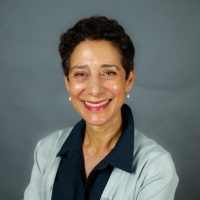A historian by training and a human rights advocate, I study Islamist totalitarianism, and the ideological roots of Terror in the French Revolution

In the confrontation between Iran’s pro-democracy activists and its Islamist state, the government’s arsenal is made of violence and lies. Violence seeks to spread fear and silence dissent through detention, torture, and executions. Our enemies’ arsenal is terrifying, and we, at first glance, seem powerless in comparison. But in reality we are stronger, for we have the truth. Faced with force and fraud, activists for human rights and democracy insist on “living in truth,” as Václav Havel put it. They rely on the truth, with its subversive might, to annihilate lies and leave tyrants speechless.
We have the truth and our commitment to it, but we also have cyberspace—something that previous generations of activists did not have. We have cyberspace, and with it the world as our audience. We can spread the truth and let it subvert tyrannies.
The main part of my human rights advocacy is done within the Abdorrahman Boroumand Center for Human Rights in Iran. Some of my advocacy related articles are accessible here.
My interest in the French Revolution is rooted in a philosophical question : why a body politic based on democratic principles denies human rights to the citizens of other countries? My first observation was that each time a Western democratic polity behaves undemocratically on the international stage it is by reference to the “nation” and its “sovereignty”, “glory,” “interests,” “honor,” “security,” etc… And “national sovereignty” is the ultimate justification of the denial of human rights.
Further research brought to light an inherent tension, not always evident, between the nation as a concept, and as a political form, and human rights as a universal principle. A tension that could be best seen in the United Nations’ Charter, on the one hand the Universal Declaration of Human Rights, on the other hand, the sovereignty of the nation-state. The tension between these two principles are at the heart of the UN’s inconsistencies and problems.
The only time in the history of Western politics that these two concepts were at play in the internal history of one nation was during the French Revolution- they were both included in the 1791 constitution. Both concepts -“human rights” and the “sovereignty of the nation”- formed the normative foundations of the state. And the French Revolution led to the Government of Terror. My research focuses on how and why a constitution based on human rights could lead to the reign of Terror. French revolutionary parliamentary debates 1789-1794 constitute my primary source.


Four decades ago, when a cleric, Ayatollah Ruhollah Khomeini, emerged on the Iranian and world political stage advocating for an unprecedented theo-political project, few, if any, within world’s liberal democracies realized they were witnessing the gestation of a new universalist ideological challenge to liberal democratic worldview. For several decades, liberal-democracies misidentified Islamist radicalism and did not consider it as a direct ideological threat despite the fact that from its inception it targeted Western democracy as its main enemy.
My research on the Islamic revolution of Iran focuses on its syncretic ideology, a combination of modern revolutionary and traditional religious elements, and its challenges to liberal democracy and its meaning within the global history of modern totalitarianism.

Ladan Boroumand
Dr. Ladan Boroumand is the co-founder of the Abdorrahman Boroumand Center for the Promotion of Human Rights and Democracy in Iran, a nongovernmental organization that promotes human rights awareness through education and information dissemination, including by way of the online human rights library Omid memorial, a website that documents human rights abuses committed by the Islamic Republic and memorializes its victims. She is the co-laureate of the 2009 Lech Walesa Award for her work in defense of human rights in Iran. In addition, she serves on the Steering Committee of the World Movement for Democracy.